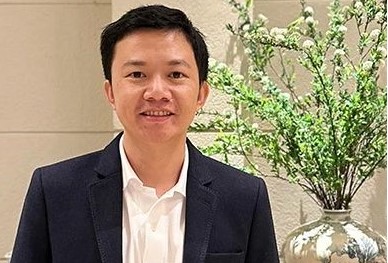Musician writes about important social history in his work
Culture - Ngày đăng : 10:26, 25/12/2024
 |
| Musician Nguyễn Bá Hùng. Photo courtesy of Nguyễn Bá Hùng |
Musician Nguyễn Bá Hùng writes songs about those protecting society, including police officers, soldiers and healthcare workers. The message is not a trendy one and the pieces do not earn him a fortune, but he still feels happy about the work he does.
He has currently released three new songs to mark the 80th founding anniversary of the Việt Nam People's Army.
Việt Nam News reporter Nguyễn Bình interviewed Hùng about his passion for composing pieces about cultural history.
What makes you want to write about history and these patriotic people?
I was lost for a long time, not really knowing what my passion really was.
I studied music pedagogy, music management, culture management and politics.
However, I always felt like I was not really myself until I began to write the songs about the soldiers. I deeply feel my concentration and passionate when I write these songs.
I always think about gratefulness. We live in peace without the smell of gunpowder. We have freedom thanks to the sacrifice of more than one million war martyrs. I'm a patriot and I think that I have to take responsibility to write about the songs.
It is truly a serious work and a sacred mission that I am honoured to carry out.
Presently, there are not many young musicians writing about these themes. It is fine because each musician has his own mission contributing to the music scene.
What is different about writing patriotic songs as opposed to romantic songs?
Writing these songs requires me to access mainstream resources from historical books, newspapers and television. Based on that research and I select stories and write my lyrics for these songs.
I need to be careful writing these songs to ensure all the historical and politic elements are correct.
I write these songs because of the urge from within me and with all my passion, so I do not find the work difficult, nor do I feel tired.
I am always optimistic and happy to write meaningful songs.
I write other songs about love, life and people and they are popular. In those cases I don't think much about what I should write, I simply make my heart flutter naturally and I write what I have on my mind.
I just want to write about history and people who contribute in their silent way to the cause of the nation. When I think about the missing fallen soldiers' remains I am moved and immediately I want to sit down at the piano and compose. I even imagine myself lying at the bottom of the river and in the deep forest.
You have written many songs about the soldiers including the epic Làng Bên Sông (Riverside Village). Why did it take you three years to complete?
I did not think about writing an epic when I began to write Làng Bên Sông. I just intended to write a song to commemorate soldiers who sacrificed and devoted their youth and their lives for national independence.
I wrote the simplest and the most truthful things, things that the epic performer and listeners cry about when singing and listening to. I feel happy to have made a small contribution to my journey telling history through music.
The history lessons that we studied at school just introduce outstanding battles, campaigns and individuals. My song highlights ordinary people who joined those battles and who took the victory.
I wrote the first part in the epic very quickly. But later I spent three years reading, researching and listening to stories told by war veterans to complete it. When I listen to the epic I feel like I have travelled back to the past and I imagine I am there in the images in a documentary.
What is the role of your songs in the music scene?
I understand profoundly the operating mechanism and structure of art. Each genre of music has its own role in society. I think the roles are equal. Depending on environment, time and situation this genre of music is preferable to be performed than the other.
I admire other musicians whose songs are popular. I am also popular myself with soldiers and policemen. When I visit military units and police force, they learn my songs by heart.
I don't compare myself to other musicians because I know what I'm doing and the value of my work. I also know the value of the contributions of the others and I respect them. We all contribute to making the music industry have more positive and good changes.
What do you do to earn your living?
I cannot earn money from writing these songs. I have other work and make music when I have money. It is difficult, but my wife and my family support me. Writing these songs is not only my passion, but it is my responsibility, offering clarity for those people who work so hard for the rest of us. VNS
